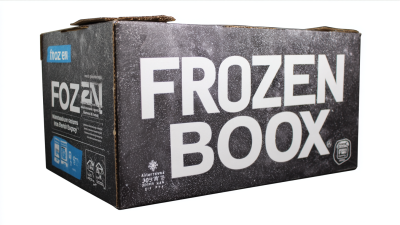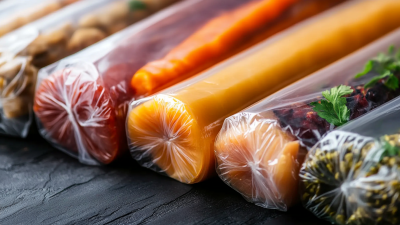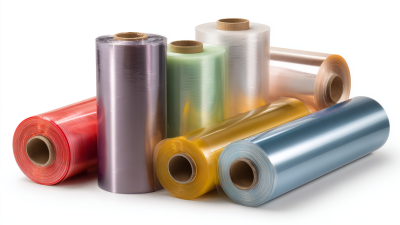10 Surprising Benefits of Using Frozen Food Bags for a Healthier Kitchen
In recent years, the culinary landscape has experienced a significant shift towards convenience and health-conscious choices, leading to a growing interest in frozen food bags. According to a report by the Food Marketing Institute, nearly 80% of American households now purchase frozen foods regularly, highlighting a trend towards more accessible meal preparation without sacrificing nutritional value. Frozen food bags not only extend the shelf life of perishable items but also promote healthier eating habits by allowing individuals to portion out meals effectively. A study from the Journal of Nutrition found that households that utilize frozen food options have a higher likelihood of incorporating more fruits and vegetables into their diets, boosting overall nutrient intake. As we explore the surprising benefits of using frozen food bags in the kitchen, it becomes clear that they are not just a convenient option but a smart, health-oriented choice for modern homes.

Understanding the Nutritional Advantage of Frozen Foods
Frozen foods often get a bad rap, but they can be a secret weapon in maintaining a nutritious kitchen. Research indicates that frozen fruits and vegetables can hold onto their vitamins and minerals effectively. According to a study published by the Journal of Food Science, freezing can preserve nutritional content far better than fresh produce that may lose nutrients during transport and storage. In fact, frozen options can retain up to 90% of their original nutrients, while fresh vegetables can lose significant vitamins within just a few days of being picked.

Furthermore, the National Frozen & Refrigerated Foods Association (NFRA) reports that the average American consumes 68 pounds of frozen fruits and vegetables each year, underlining the growing recognition of these products' nutritional value. They provide convenience without compromising health benefits, making them an ideal choice for busy households. The versatility of frozen foods enables consumers to easily incorporate a variety of nutrient-dense options into their meals, ultimately contributing to a balanced diet. Hence, understanding the nutritional advantage of frozen foods can empower consumers to make healthier choices while minimizing food waste and preparation time.
Maximizing Shelf Life: How Frozen Food Bags Keep Ingredients Fresh
When it comes to keeping ingredients fresh, frozen food bags are a game changer. They provide an airtight seal that locks in moisture and flavor, preventing freezer burn. By using these bags, you can extend the shelf life of your fruits, vegetables, and meats significantly compared to traditional storage methods. This not only helps you reduce food waste but also ensures that your meals are packed with nutrients.
**Tips for Maximum Freshness:**
1. Before sealing, remove as much air as possible from the bag to ensure a tight vacuum. This will help in minimizing the chances of freezer burn.
2. Label each bag with the date and contents to keep track of what you have stored. This will make meal planning easier and help you use older ingredients first.
3. Portion out items before freezing to avoid thawing and refreezing larger quantities, which can compromise texture and taste.
Incorporating frozen food bags into your kitchen routine can lead to a healthier lifestyle. By consistently using them to store your ingredients, you can ensure that the food you prepare retains its quality and flavor, making each meal a delight.

Convenience in Meal Prep: Saving Time with Frozen Options
The increasing popularity of frozen food bags has brought a wave of convenience to today’s meal prep routines. With busy schedules and fast-paced lifestyles, utilizing frozen options allows individuals to save significant time while preparing nutritious meals. Frozen food bags, often pre-portioned and easy to store, enable quick access to healthy ingredients, streamlining the cooking process. This approach not only reduces food waste but also makes it easier to maintain a balanced diet, as frozen fruits and vegetables retain essential nutrients and flavors.
Moreover, the unprecedented growth trends in various food markets indicate a rising consumer preference for practical meal solutions. As the frozen food segment becomes more prevalent, consumers are discovering the benefits of having a supply of ready-to-cook items at their fingertips. A significant projection is seen in markets, such as the canned fruit market, which is expected to grow from $12.67 billion in 2025 to $16.23 billion by 2032, highlighting an overall shift towards convenience-driven food choices. In this landscape, frozen food bags emerge as a game-changer, making meal prep not only easier but also more aligned with a health-conscious lifestyle.
10 Surprising Benefits of Using Frozen Food Bags for a Healthier Kitchen
This chart illustrates the various benefits of using frozen food bags in meal preparation, highlighting time savings, nutritional value, cost-effectiveness, and convenience.
Cost-Effectiveness: Budget-Friendly Benefits of Freezing Food
One of the standout advantages of using frozen food bags lies in their cost-effectiveness, making them a budget-friendly option for many households. According to a report by the Food Marketing Institute, frozen fruits and vegetables can be around 30% cheaper than their fresh counterparts, especially when bought in bulk. This notable cost reduction allows families to enjoy a wider variety of nutritious foods without straining their budgets. Additionally, freezing food helps to minimize waste, as it allows you to store surplus items that might otherwise spoil, transforming your kitchen into a more economical space.
**Tips:** To maximize savings, consider investing in quality, reusable freezer bags. They can maintain the freshness of your frozen foods longer than conventional bags. Also, designate a “freezer meal day” to prepare and store multiple meals at once, which can save both time and money.
Another economic benefit of utilizing frozen food bags is the reduction of impulse purchases. The USDA reports that meal planning and utilizing frozen bags can reduce grocery bills by up to 25%. When you have pre-portioned meals in your freezer, you’re less likely to opt for costly takeout or pre-packaged meals that tend to be more expensive.
**Tips:** Always label your frozen bags with dates and contents, ensuring that you use older items first. This practice can help you avoid forgetting about food in the back of the freezer, ultimately saving you money and avoiding waste.
10 Surprising Benefits of Using Frozen Food Bags for a Healthier Kitchen - Cost-Effectiveness: Budget-Friendly Benefits of Freezing Food
| Benefit | Description | Estimated Savings ($/month) |
|---|---|---|
| Reduced Food Waste | Freezing food extends shelf life and prevents spoilage. | $30 |
| Bulk Buying | Ability to buy in bulk when items are on sale, then freeze. | $20 |
| Less Convenience Food | Encourages cooking from frozen ingredients rather than purchasing costly convenience foods. | $25 |
| Quicker Meal Prep | Ready-to-use frozen ingredients decrease meal preparation time. | $15 |
| Seasonal Ingredients All Year | Access to seasonal produce year-round without premium prices. | $10 |
| Health-Conscious Options | Easier to choose nutritious frozen options without added preservatives. | $12 |
| Meal Variety | Wide variety of meals can be prepared with frozen foods. | $18 |
| Long-Term Storage | Stocking up on discounts or sales means fewer shopping trips. | $22 |
| Reduced Cooking Time | Frozen items often require less cooking time, saving energy. | $14 |
| Staying Budget-Conscious | Overall, using frozen foods can lead to a more budget-friendly kitchen. | $16 |
Reducing Food Waste: The Eco-Friendly Impact of Using Frozen Bags
The adoption of frozen food bags in the kitchen can significantly reduce food waste, making it an eco-friendly choice for environmentally conscious consumers. By utilizing these bags for meal prep and storage, individuals can portion out just the right amounts of ingredients, minimizing the likelihood of spoilage. Leftover vegetables, herbs, and cooked meals can effortlessly be frozen, extending their shelf life and ensuring that every bit of food is appreciated rather than discarded. This proactive approach not only cuts down on waste but also reduces the carbon footprint associated with food production and disposal.
Moreover, frozen food bags promote an organized kitchen and encourage mindful consumption. With proper labeling and portioning, individuals can easily identify what they have and when it was stored, facilitating better meal planning. This increased awareness can lead to more strategic grocery shopping, further decreasing the chances of over-purchasing and ultimately contributing to food waste. Thus, embracing the use of frozen food bags not only enhances kitchen efficiency but also aligns with sustainable practices that benefit the environment.
Related Posts
-

What Are Frozen Food Bags and How Do They Revolutionize Food Storage?
-

Chinese Manufacturing Elevates Global Standards Through Best Frozen Food Shipping Boxes
-

How to Maximize Freshness and Shelf Life with Retort Pouches for Food Packing
-

Revolutionize Your Business with Premium Food Packaging Roll Plastic Film Solutions
-

How to Choose the Right Plastic Film Roll for Food Packaging Based on Industry Standards
-

2025 Food Packaging Trends: 5 Key Insights for Sourcing the Best Plastic Rolls

 中国
中国